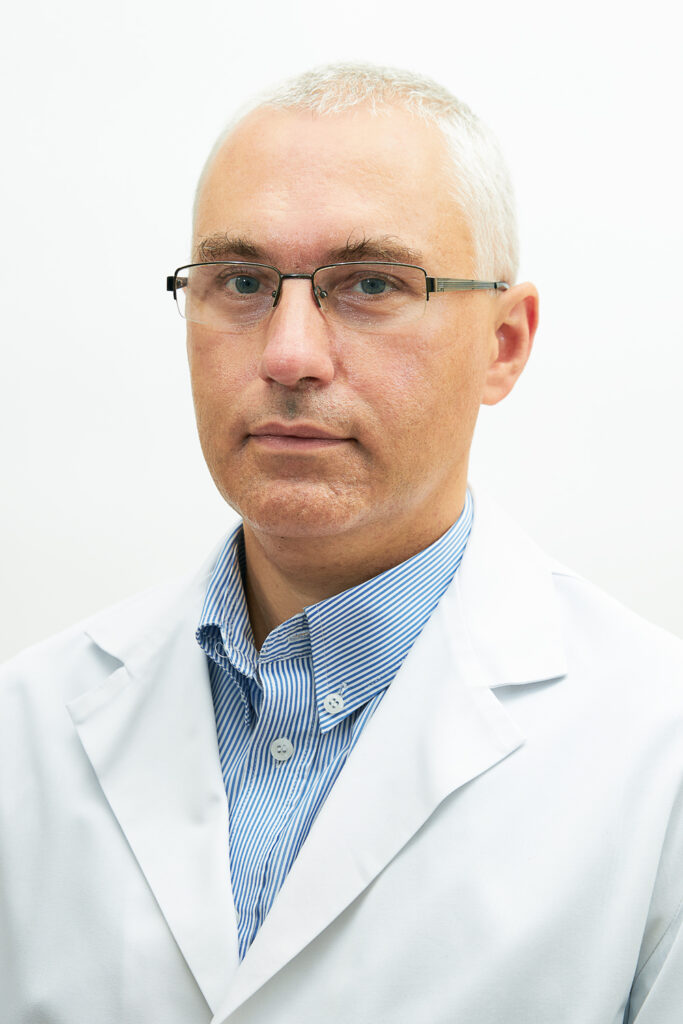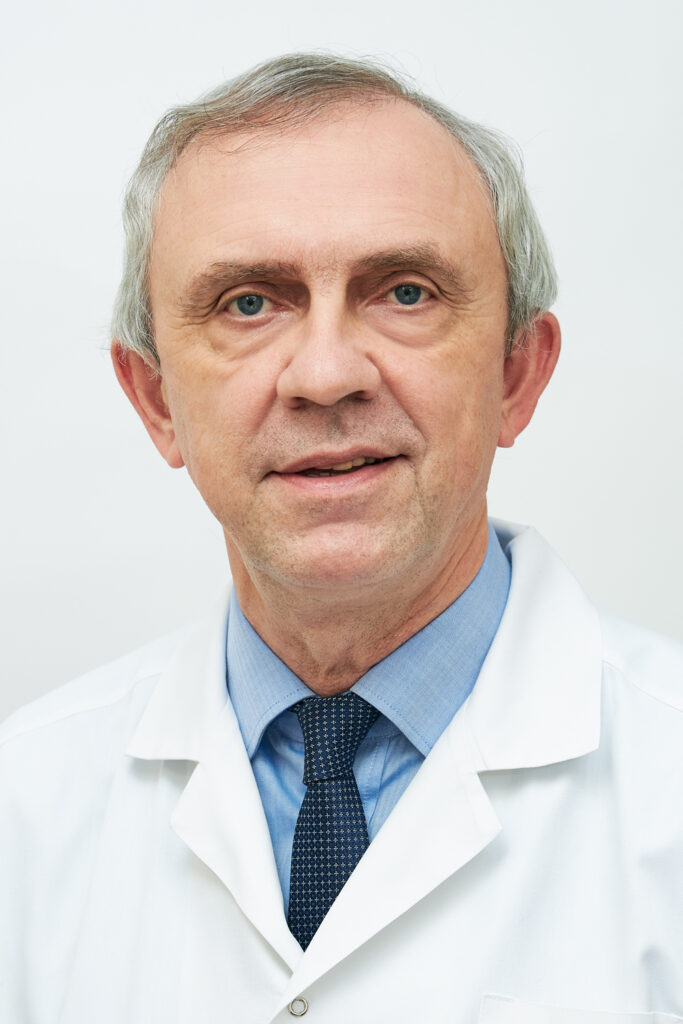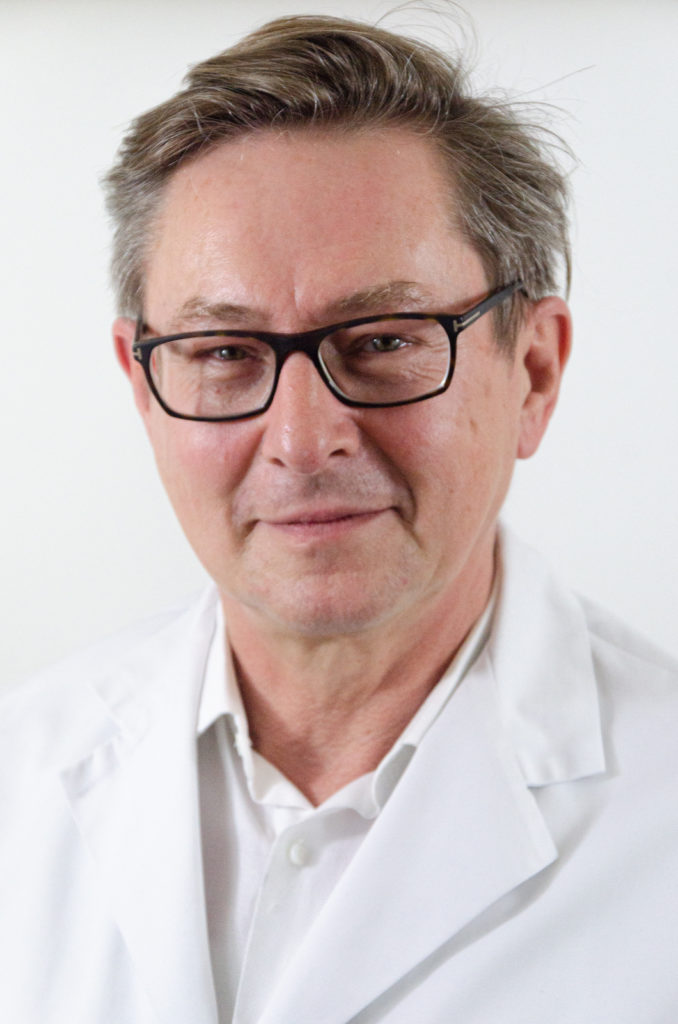Our psychologist will adjust the form of therapy to the individual needs of the person requesting the consultation. At the Clinic of the Polish Gastroenterology Foundation, we care about comfort and discretion so that the patient has the opportunity to see a psychologist and can decide on further cooperation.
Badania i zabiegi
abdominal ultrasound
SCREENING PROGRAM
Colorectal cancer is one of the most common malignant neoplasms. Central Europe, including Poland, belongs to the region with moderate incidence. In our country, in 1996, the incidence rate was 28.8 per 100,000 for men and 25.4 per 100,000 for women.
In terms of incidence and deaths, colorectal cancer ranks second among malignant neoplasms in Poland.
You don't have to die of colon cancer !!!
Almost all cancers develop on the basis of a defined and well-established precancerous condition of polyps (adenomas - benign tumors of the intestine), which eventually undergo malignant transformation after several years of slow growth in cancer. Polyps can be easily removed endoscopically before they develop into cancer. The time that elapses from the appearance of a small adenoma to its transformation into cancer is long (approximately 10 years), which creates a unique chance for detection and effective therapeutic intervention.
Full colonoscopy with polyp removal reduces the incidence of colon cancer by 76-90%.
The program is financed by the Ministry of Health, it has a statutory authorization - it is part of the NATIONAL PROGRAM FOR COMBATING CANCER DISEASES. The patient does not pay for the performed colonoscopy, histopathological examination of the removed polyps or sections. The Ministry of Health also reimburses anesthesia in 50% of patients examined in the program. After the limit of free anesthesia has been exhausted, it is possible to perform the test under anesthesia, for which the patient pays.
Some of you receive a letter invitation to be examined under the program. In addition, it is possible to perform the test on people who meet the following criteria:
- all people aged 50-65 without symptoms of colorectal cancer
- people aged 40-65 without symptoms of colorectal cancer, who had at least one first-degree relative (parents , siblings, children) suffering from colorectal cancer.
Gastroscopy
Gastroscopy is an endoscopic examination of the upper gastrointestinal tract, ie the esophagus, stomach and duodenum. It allows for accurate diagnostics as well as therapeutic action including, among others, removing a foreign body, polyps or stopping bleeding. The examination is safe, painless and short. Diagnostics is performed using a gastroscope, i.e. a flexible probe equipped with a vision track. This allows the doctor to accurately assess the image displayed on the monitor. This enables the direct assessment of the mucosa, taking specimens for histopathological examinations and for assessing the presence of Helicobacter pylori , the so-called urease test.
Indications
Diagnostic gastroscopy is recommended for:- abdominal pain, belching, flatulence, heartburn and so-called dyspeptic symptoms,
- suspected gastric or duodenal ulcer,
- suspected cancer,
- swallowing difficulties,
- weight loss, anemia,
- suspected or presence of gastrointestinal bleeding,
- suspected drug-induced damage to the mucosa of the upper gastrointestinal tract in long-term patients using non-steroidal anti-inflammatory drugs,
- and as a prophylactic examination in patients with an increased risk of cancer development (people with long-term gastroesophageal reflux disease, with Barrett's esophagus, with pernicious anemia in the course of atrophic gastritis, after gastric resection).
Preparation for gastroscopy
- On the day of the examination, for at least 6 hours until the examination is performed, please refrain from consuming any meals and drinking fluids. The patient must be fasting.
- People with diseases that require constant, regular medication (e.g. hypertension, heart disease, epilepsy, etc.) on the day of the examination should take the morning dose of the drug with a little water.
- People suffering from diabetes should consult a doctor on how to prepare for the test and inform about diabetes on the registration of our center.
- People taking medications that reduce blood clotting (e.g. acenocoumarol, sintrom, ticlide, plavix or aspirin, acard, acesan and others) should inform the doctor performing the test.
- Pregnant women and breastfeeding mothers should consult a doctor on how to prepare for the test.
Gastroenterology
Gastroenterology, gastrology is a branch of medicine dealing with the function and diseases of the digestive system, in particular the esophagus, stomach, duodenum, small and large intestines and pancreas. A related field is hepatology, which deals with diseases of the liver, bladder and bile ducts. Inflammatory, infectious, neoplastic and functional diseases are of interest to gastrology and hepatology. Classic examples are gastro-oesophageal reflux disease, Helicobacter pylori peptic ulcer disease, bile duct stones, fatty liver, liver inflammation and cirrhosis, tumors of the esophagus, stomach and intestines (especially colon), and bowel syndrome irritable.
Urethral ultrasound
Pediatric gastroenterology
Colonoscopy
Colonoscopy is an endoscopic examination of the large intestine. It is the best examination of the large intestine available, allowing for the direct and most accurate assessment of the large intestine, removal of polyps and sampling for histopathology. The examination is performed using a colonoscope, i.e. a flexible probe 130-160 cm long, equipped with a vision track. During the examination, the image of the inside of the intestine is displayed on the monitor and assessed by the doctor. During the examination, it is also possible to take a biopsy and to take therapeutic measures, e.g. polypectomy or stopping bleeding. Colonoscopy requires preparation (cleaning) of the large intestine prior to the examination.
Ultrasound of the prostate gland TRUS
Rubberizing of hemorrhoids
Banding hemorrhoids (rubberizing hemorrhoids) is a procedure performed by a specialist physician, which consists in putting on elastic bands to close the varicose veins. Treatment is slightly onerous for the patient.
Proctology
Proctology is a field of surgery covering the diagnosis and treatment of diseases of the colon and rectum.
In the proctology clinic we treat, among others:
- haemorrhoids - hemorrhoids, incl. using hemorrhoids banding,
- anal canal fissures or fistulas,
- solitary rectal ulcer,
- defecation disorders.
Penile Doppler ultrasound
Bariatrics
The field of medicine dealing with the diagnosis, determination of causes, prevention and treatment of obesity , including surgical methods
Polypectomy
"Polyp" means a lesion raised above the mucosa. Histopathological examination determines its microscopic structure. Endoscopic polypectomy in the large intestine is a safe and painless procedure. On an outpatient basis, polyps up to 10 mm are removed. Larger or numerous are removed during hospitalization.
Testicular Doppler ultrasound
Rectoscopy
Rectoscopy is an examination of the anal canal and rectum with the use of a disposable speculum - rectoscope. The examination is performed in the lateral or knee-elbow position. The aim of rectoscopy is the morphological assessment of the mucosa of the lower colon. If necessary, the doctor may take material for bacteriological or histopathological examination during the examination.
Dietetics
Dietetics is a branch of medicine dealing with the proper nutrition of adults and children and is often an important element in the treatment of many diseases. Among the diseases of the so-called diet-dependent people can be mentioned, among others:
- digestive system,
- liver,
- pancreas,
- urinary system,
- metabolic eg diabetes,
- cardiovascular system (hypertension, atherosclerosis, ischemic heart disease),
- allergies in adults and children (celiac disease).
Testicular ultrasound
Sigmoidoscopy
Simoidoscopy is an endoscopic examination of the end of the large intestine - rectum, sigmoid colon and descending colon. The examination, like the colonoscopy, is diagnostic or therapeutic. It is based on the assessment of the mucosa and enables the removal of polyps or stopping bleeding.
Psychology
Ultrasound of the scrotum
USG
Ultrasound (USG) is an examination that uses ultrasound waves. The use of ultrasound waves in diagnostics is safe and they do not have any harmful effects, even in the case of repeated tests. For this reason, ultrasound examination is called non-invasive and can be performed even in young children and pregnant women.
Ultrasonography has been used in all medical specialties. In gastroenterology, it is the primary examination of abdominal organs such as the liver, gallbladder and bile ducts, pancreas and spleen. Using ultrasound, it can be determined whether there are focal lesions (tumors) in the abdominal organs, liver cirrhosis, inflammatory changes in the pancreas or gallbladder stones. In specialized gastroenterological centers, ultrasound is also used to assess the intestines, especially in patients with Crohn's disease, ulcerative colitis and diverticulitis.
In our ultrasound laboratory we perform the following tests:
- abdominal
- kidney
- bladder
- prostate (prostate)
- kernels
- penile
- thyroid
- breasts
Endocrinology
Endocrinology is a branch of medicine that deals with disorders of the functioning of the internal glands (cerebral pangs, parathyroid glands, thyroid, adrenal glands, testes and ovaries) responsible for secreting hormones. Disorders in the secretion of hormones lead, among others, to for overactive or underactive thyroid gland, menstrual disorders or infertility.
In our clinic, we conduct full endocrine diagnostics of adults and children in cooperation with experienced doctors.
Breast ultrasound
Genetic research
A gene is a conventional unit of inheritance that causes the occurrence of a specific feature of an organism.
Genetic diseases are a heterogeneous group of diseases caused by an abnormal structure or number of genes or chromosomes.
Each cell of the human body (except the egg or sperm) has a complete set of genetic information in the form of 23 chromosomes inherited from the mother and 23 chromosomes inherited from the father.
The chromosome is a double-stranded DNA molecule.
Genetic testing is the analysis of a person's genetic material, that is, DNA. DNA is a chemical compound found in chromosomes, on which individual, unique information concerning, among other things, the appearance and disease predisposition of each person is "written".
Genetic diseases are congenital, and accompanying abnormalities are often detectable early in life, in fetal life, or shortly after birth. Not all genetic diseases are inherited. Some are caused by a new mutation that took place in the egg or sperm cell before fertilization, much less often in one of the cells of a human embryo at a very early stage of its development.
Not all genetic diseases are accompanied by ailments, it often happens that we learn about a genetic disease at an adult age.
By increasing the quality of medical care and patients' awareness of risk factors, we offer a modern diagnostic tool.
To perform a genetic test, a sample of the patient's biological material is needed - blood or saliva.
The tests are performed at the doctor's request, after receiving a referral. Before the examination, the patient also fills in a document entitled "Informed consent to the collection of biological material." Reading takes a maximum of 25 business days from downloading the material. To obtain the result, you must visit the doctor who ordered the test.
Children's endocrinology
Endocrinology is a branch of medicine that deals with disorders of the functioning of the internal glands (cerebral pangs, parathyroid glands, thyroid, adrenal glands, testes and ovaries) responsible for secreting hormones. Disorders in the secretion of hormones lead, among others, to for overactive or underactive thyroid gland, menstrual disorders or infertility.
In our clinic, we conduct full endocrine diagnostics of adults and children in cooperation with experienced doctors.
Thyroid ultrasound
General surgery
Laboratory tests
Also known as: laboratory diagnostics, medical analytics, laboratory medicine is a discipline of medicine whose task is to determine the composition and biological and physicochemical parameters of blood or other materials taken from the patient. They are used for prophylactic purposes, diagnosis or treatment monitoring.
Laboratory tests are carried out using the techniques of:
- microscopic
- biochemical
- immune
- bacteriological
- instrumental analysis
Ultrasound elastography
Ultrasound elastography is an innovative method of imaging organs and tissues. It is a digital extension of the palpation examination. The assessment of the hardness of the tissue or organ allows for a thorough examination and, consequently, the detection of lesions. Elastography is used in the diagnosis of breast, thyroid and liver diseases.
Cardiological diagnostics
EKG - Echocardiography allows the assessment of heart function. It consists in connecting the electrodes to the chest and reading the voltage difference (potential) between them. The ECG record is obtained in the form of an electrographic curve on graph paper or on a monitor screen. The test result allows for the diagnosis of ischemic heart disease
Surgery and Oncology
Surgery of the gastrointestinal tract is a branch of medicine that deals with the surgical treatment of diseases of the digestive system (including those with neoplastic origin). In the case of severe or complicated diseases, gastrologists in our clinic cooperate with surgeons.
The development of endoscopy accelerated the penetration of these two fields - gastrology and surgery. Specialists in both fields use surgical endoscopy. In turn, the improvement of endoscopic procedures sometimes allows to avoid surgery. Classic examples of surgical intervention in gastrointestinal neoplasms are: cancer of the esophagus, stomach, pancreas, bladder and bile ducts, and large intestine. In non-neoplastic diseases, surgical intervention is necessary, among others, in complicated or non-pharmacologically treatable peptic ulcer disease, gallbladder stones and complications of inflammatory bowel diseases (stenosis, toxic distension or perforation).
Clinical oncology
Clinical oncology is a branch of medicine dealing with the prevention, diagnosis and treatment of neoplastic diseases.
In our clinic, clinical oncologists offer consultations on optimal diagnostics, planned surgical and adjuvant treatment, e.g. chemotherapy or radiotherapy. We mainly deal with cancers of the gastrointestinal tract - esophagus, stomach, colon and rectum, pancreas, bile ducts and liver.
Urology
Anesthesiology
Cardiology
Cardiology is a field dealing with the diagnosis and treatment of cardiovascular diseases, such as arterial hypertension, atherosclerosis or coronary artery disease.
Cardiac diagnostics
- EKG - Echocardiography allows the assessment of heart function. It consists in connecting the electrodes to the chest and reading the voltage difference (potential) between them. The ECG record is obtained in the form of an electrographic curve on graph paper or on a monitor screen. The test result allows for the diagnosis of ischemic heart disease.
Rheumatology
Rheumatology is a field of medicine dealing with the diagnosis and treatment of chronic inflammatory changes in the bone and joint system and connective tissue.
Rheumatoid diseases include, among others: rheumatoid arthritis, gout, systemic lupus erythematosus or osteoarthritis.







